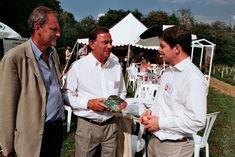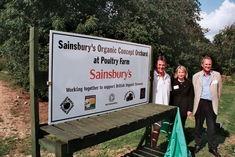

A shared initiative between fourth generation Kent growers HE Hall & Son, marketing company OrchardWorld and Sainsbury’s has resulted in the UK’s largest organic concept apple orchard being unveiled last week.
The objective is to boost production levels of selected traditional English varieties and several newcomers to levels far beyond current yields, not only making it more cost effective but also giving Sainsbury’s customers more organic fruit between August and April.
Just over three per cent of organic apples sold in the UK are home-grown, but results of trials of a range of new techniques indicate that Sainsbury’s could potentially increase its proportion to as high as 70 per cent during the English season.
The key is high-density planting, based on 3,300 trees a hectare compared with the currently accepted figure of 800trees/ha, supported by new techniques such as pheromone treatment to predict pests and diseases, allowing action to be taken in advance. To aid this there is also a fully-automated weather station recording rainfall, temperatures and humidity.
Mark Culley, managing director of OrchardWorld, which has funded the £125,000 set-up cost, said the Sainsbury Concept orchard - covering four hectares at Marden - is already the largest in the industry. “It is now an experimental orchard on a commercial scale,” he said.
The initial aim is to produce 25 tonnes a hectare within two years of planting, compared with the current accepted maximum in the limited English organic sector of 10t/ha. But as trees mature, that figure could double again, according to Mike Jobbins, OrchardWorld’s technical director.
“We have an environmental responsibility to find better ways of growing and distributing top fruit and we fervently believe that this new orchard is a huge step forward,” Culley said, adding that the eventual target is to grow using new methods on 40ha or more.
The fruit under trial includes Cox, Gala and Braeburn, although opinions still differ widely as to their suitability for organic production due to susceptibility to both root and fungal diseases.
One reason why these apples are being grown “is simply because they are enjoyed by our customers,” said Connor McVeigh, Sainsbury’s category manager. “We have to take the view that is what they want.”
“Some people have told us we are mad,” admitted grower Peter Hall, “and we realise that it will be difficult. But we believe the success is in the detail, and it is possible because Sainsbury’s is giving us its long-term backing.”
The orchard also contains Estival, Early Windsor, Pinova, Egremont Russet, as well as Bramley. It will complete the conversion process by 2009.



